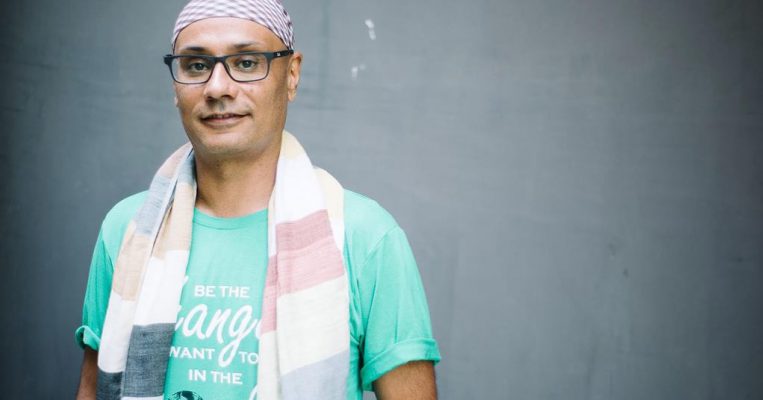Happiness, albeit “true” happiness , not the feigned kind we muster when out and about and in front of people, seems an elusive thing. Some say, it’s almost like a unicorn, in that it is so rare, or non-existent. This feature is about an amazing gentleman, who not only searched for his “unicorn” but chased it down. Be inspired! Read on to find out how one determined man who decided to pursue true and lasting happiness finally found it.
Happiness does not always mean “more”–it can be achieved with “less”
In a large, almost utopian Cambodian village nestled in the outskirts of Phnom Penh, the Sonas team of weavers begins their workday bright and early at 6am. After breakfast with his host family, Paul heads over to Sonas World’s workshop to meet with his amazing team comprised of these inspiring women who weave the most sublime cotton scarves.
Before the team begins its workday, Paul gathers them together for the morning’s words of encouragement. You see, like most successful corporations and enterprises Paul is a big believer that “happiness creates abundance”. So before anyone sits in front of a loom, Paul makes it a point to infuse happiness into his team, by speaking life into these women weavers.
Since Sonas‘ inception in 2012, Paul has made it his life’s mission to make a difference in the world. The word SONAS means “happiness” in Irish and “abundance” in Punjabi —and this amazing organization has always believed that “happiness produces abundance”. From the beginning, Sonas has done the unimaginable—created a happiness index with the University of Oxford that measures happiness (wow!) and successfully proven that changing lives is about empowerment not charity, resulting in self-sustaining communities where poverty isn’t a “thing” to be fought.
Empowerment is the word of the day and it is motivated by this happiness with which Paul lives his truth–helping to birth abundance and prosperity in the lives of others.
Sonas is passionately committed to dignifying and honoring local entrepreneurs, especially women, in rural Cambodia. Along with co-founder Keeva Murtagh, they have immersed themselves in these villages, inspiring women entrepreneurs and supporting them through training, funding and other resources that allow these women to connect with the global market for the goods they produce.
Une Écharpe – Une Vie has recently partnered with Sonas to develop a capsule collection of amazingly soft, cotton scarves in our very own inspired designs for Spring/Summer 2017, and we can’t wait to share them with you soon!
The Path to Englightenment
Prior to Sonas, Paul worked as a civil engineer for a well-known Swiss corporation. His leadership position guaranteed him a hefty salary, which paid for his very comfortable and successful life. But, according to Paul, something was always missing.
“I always wanted to do something worthwhile. I felt that I needed to do something bigger–to help. So I became heavily involved in CSR (corporate social responsibility) programs for my company. I always wanted to do good and give back and at that time, this was how I pursued that.”
Little did he know that his “aha” moment would come sooner than expected.
“At one point in my career, while living in London, I decided to do an executive MBA. This MBA had a CSR component that had us travel to corporations across the globe, in order to learn more about how they conducted their programs. On one particular trip, I and a team of nine others found ourselves in one of South Africa’s largest slums located in Cape Town.”
This trip would forever change Paul’s life and become his profound “aha” moment.
“We were taken to what I like to call, “the world’s smallest BnB”, the home of a woman named Vicky.”
Paul was no stranger to humanitarian work. In fact, in Canada where he’s originally based, he joined developmental trips and visited the slums of India, but this stint in Cape Town was different–it would shock him to his core, in a way he least expected.
“Vicky took me to the rooftop of her home and said to me, ‘Paul, I want you to look around and tell me what you see.’”
“I took a few moments and surveyed the entire area, about a 1-2 km radius and realized that I was looking at some of the happiest people I had ever seen. Colorful homes powered by solar panels, no less, had women sitting in groups crafting jewelry and laughing, kids playing outside while singing songs, using sticks from the ground as instruments. Everywhere I looked I saw happiness.”
This life-changing moment was the beginning of Paul’s quest for his own happiness.
People need to be empowered not pitied
Vicky, who later became one of Paul’s closest friends, said to him, “I want you and people like you (ie. educated, well-off) to come here not to look down on us but rather see how resourceful we are. I want you to learn something from us, not pity us.”
According to Paul, “There was a dignity and strength in Vicky’s voice that I marveled at. She was happy and she was replicating this happiness all around her. I remembered all the colorful homes, solar panels and happy people surrounding her own, tiny, colorful house.”
What Vicky told Paul next would forever alter how he saw poverty and the poor.
“Please don’t give out anything in the streets, instead I need you to believe in people’s potential. Believe in us.”
“That’s when it hit me,” says Paul. “I felt ashamed, that I had come to this place with my preconceived notions of what the poor “needed” from us, from me. I was misinformed about the whole idea and notion of poverty and those “suffering” from it. That day, on top of Vicky’s roof, I didn’t impart anything to them, instead I realized that Vicky and her tight-knit community had taught me something. That was the day I learned about true happiness and from that moment on experienced a massive paradigm shift.”
Leaving comfort to pursue happiness
Paul’s visit to South Africa and his newfound friendship with Vicky was the catalyst that got the proverbial ball rolling.
“After that, I had a lot more questions about development work, aid and charity, and at that time came in contact with Professor Yunus.”
Professor Muhammad Yunus is a Nobel Peace Prize winning Bangledeshi economist and social entrepreneur who fast became one of Paul’s most important mentors. He is the author of the book “Creating a World Without Poverty”. He’s seen here, speaking at the recent World Economic Forum in Davos, Switzerland.

“Professor Yunus was the one who first introduced me to social enterprise or social business. He said to me, “Aid or charity cannot empower people. You cannot fight anything. There is no need to fight poverty, instead we should be talking about empowerment”.
It was then that Paul realized that despite his beautiful and comfortable life he was not truly happy. He muses, “I would say to the people, if you give me 1% of your happiness, I would be happy. I saw that what would make me happy was if I pursued happiness by establishing a social enterprise, putting my corporate skills to good use in order to help change lives, thereby changing the world. It needed to start with me.”
Tragedy turns into triumph
It wasn’t long after his trip to Cape Town that Paul decided it was time to leave the security of the corporate environment and jump– feet first– into this life-changing idea of establishing a social business. But before he could do this–tragedy struck.
“Just as we were about to begin this work in earnest. We were given word that Vicky was murdered by her alcoholic husband. I was devastated. She was one of the people who inspired me to go down this path. She’s only one of many unsung heroes, I feel, whose profound impact on my life only motivated me even more.”
Paul’s darkness quickly turned into hope when Vicky’s brother urged Paul to carry on Vicky’s message of empowerment. “With my friend Keeva, we continued on to found Sonas World.”
The path towards social-entrepreneurial success
“I sought Professor Yunus’ advice, he’s one of my mentors, and asked him how I should begin this dream I had had in my heart for so long and here’s what he said,”:
- Surround yourself with like-minded individuals, come under the mentorship of someone you know and trust who has already done it. They can walk you through what you need to do, help you when you face challenges and be that encouragement when you need it most.
- You have to go there (wherever THERE may be) and immerse yourself in that community, that village, that tribe. You cannot know who you are helping unless you become a part of them, their situation and understand life from their eyes.
- Learn what you need to but most importantly, unlearn what you need to. Once there, you need to live among the community and learn all you can about them, who they are, what they do and how you can support and empower them. You also need to cast off your preconceived notions of who they are and what you think they need. Your job is to go and see if you can actually survive.
“I applied all of it, and in the midst of it understood what empowerment was really about.”
According to Paul, “ Because we have a lot of things, we “think” we’ve made it, that we are confident and successful. We allow this to define us..”
For Paul, confidence and success does not equal lasting happiness.
“At least for me, I realized that life wasn’t about things, it’s about people. And I was going to use my life not only to improve lives, to make others happy, but to pursue my own happiness by looking outside of myself, and giving of myself. It was in all of this that I found my own true, lasting happiness.”
I asked Paul, “So, are you finally happy?” He answered, “Yes. I am extremely happy.”
**Stay tuned for Part 2 of Paul’s inspiring story. How to overcome your fears and invest in yourself…”
xo,
Tiff



